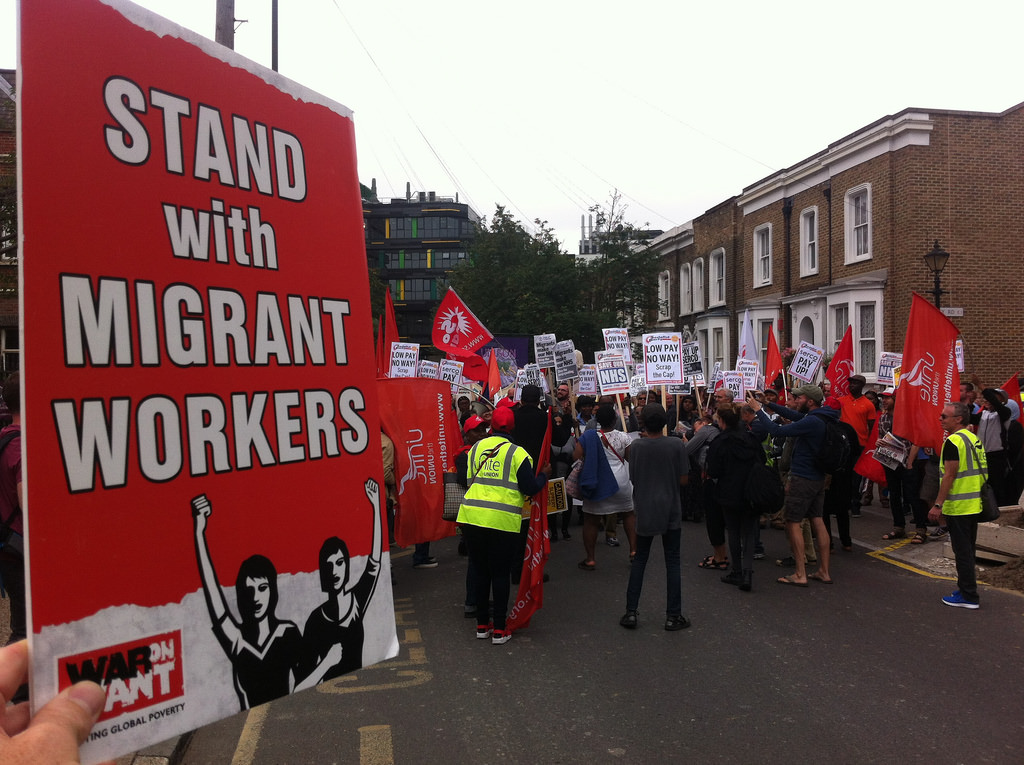Post financial crisis, the most persistent scapegoats for many parts of society has been migrants and refugees. Used by mass media, politicians and common people alike, the problems of Europe have been condensed in the spiteful image of the ‘others’.
‘Others’ to imagined national communities, ‘others’ to the European project and what it supposedly stands for.
In Britain, throughout the EU referendum and after the Brexit vote, migration – in particular EU migration – was used by the Conservative Party as the number one reason for voting Leave and the most precious benefit of a post Brexit Britain.
Three to four decades of neoliberalism have brought working communities of one of the richest countries of the world to such a level of despair, that they are willing to go along with the myth of the foreign (EU) worker as undercutting the British Labour market and becoming an increasing burden on the British welfare state. Worse yet: a small part of the British left is willing to repeat the same arguments, in defence of the (white, male) British working class. The neoliberals have successfully confused the freedom of workers with the freedom of people – and too many people have bought it.
Confronted with this public hostility, the Labour leadership is trying to navigate the party between a number of contradicting positions all supported by different parts of the party. First, the pro-EU right-wing of the party, which worries less over the rights of migrants and more of the rights of businesses. The reality is that both the skilled and the unskilled labour market in Britain recruits from the EEA. The current visa system makes it almost impossible for non-EEA to fill these positions, so they recognize the economic consequences of ‘controlled migration’ and the dire prospects for British economy. But their priority is remaining in the single market – if they can dispense with free movement, they will.
Second, the anti-migration (and anti-EU) left of the party which is against the ‘undercutting’ of British jobs. They believe that controlled borders will allow a socialist government to protect the (national) labour market from the attacks of international capital and would (or so they say) want more non-EEA migration. These voices are not many, but still they have influence upon the party leadership.
Finally, there are the rest of us, members of the left of the Labour party, determined to defend freedom of movement and aspiring to see a Labour government that not only will preserve the rights we have now as migrants but will aspire to strengthen the rights of all workers. Both the cross-party campaign group Another Europe is possible (AEIP) and the Labour for Free Movement campaign are committed to defending and extending the rights of migrants. The report released by AEIP explains how the Conservative proposals for ‘controlled’ migration and temporary visa requirements for EU migrants, will enable the employers to act as guest worker’s sponsors making impossible for migrants to change employer without risking deportation. Furthermore, the Conservative proposals will strengthen ‘foreign only’ recruitment practices, effectively creating a new pool for cheap labour and an underground black market.
The proposals of AEIP and of Labour for Free Movement, are for “free movement+”: sector-by-sector bargaining agreements setting the minimum standards of pay and conditions for all workers; EEA-wide review of Posted Workers Directive establishing an anti-undercutting principle; strict penalties for unscrupulous employers; banning of foreign-only recruitment practices and agencies.
The “free movement+” proposals are the only policies strengthening all workers rights and the only antidote to the Conservative, toxic agenda.
Marina Prentoulis is a Senior Lecturer in Media and Politics at the University Of East Anglia.
This article was originally published on Transform! Europe. Read the original article.





